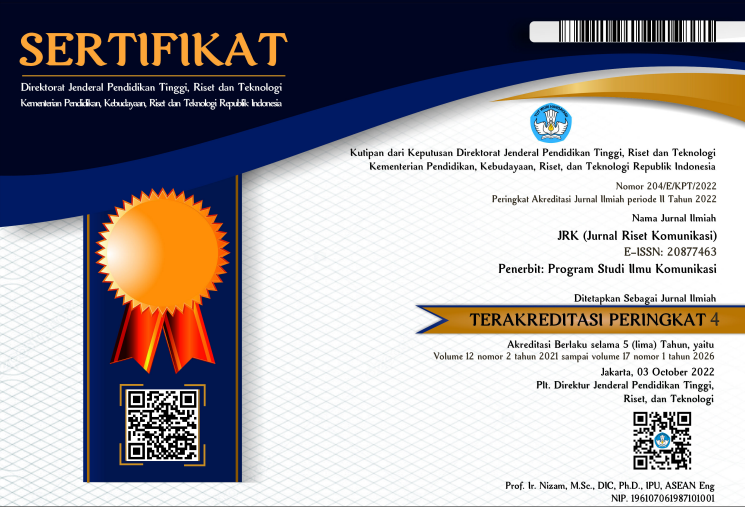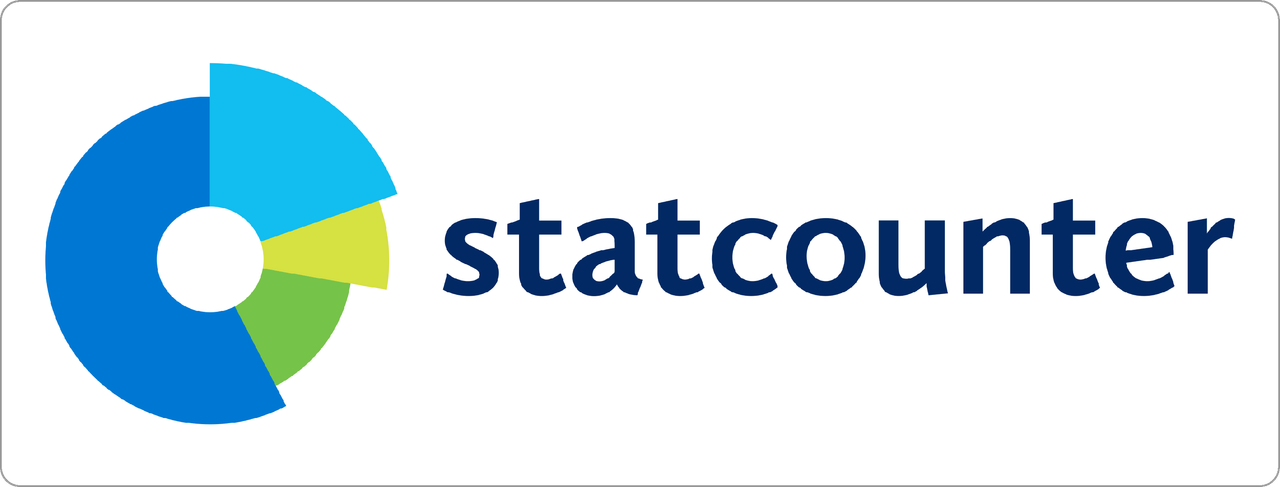THE UTILIZATION OF DIGITAL MEDIA IN HEALTH COMMUNICATION IN INDONESIA
Abstract
Full Text:
PDFReferences
Arnstein, S. R. 1969. “A Ladder of Citizen Participation.” Journal of the American Institute of Planners 35(4).
Bawden, D. 2001. “Information and Digital Literacies: A Review of Concepts.” Journal of Documentation.
BPS. 2021. “Statistik Indonesia.” Badan Pusat Statistik.
Braun, V., & Clarke, V. 2021. “One Size Fits All? What Counts as Quality Practice in (Reflexive) Thematic Analysis?” Qualitative Research in Psychology 18(3):328–352.
Chou, W. Y. S., Hunt, Y. M., Beckjord, E. B., Moser, R. P., & Hesse, B. W. 2013. “Social Media Use in the United States: Implications for Health Communication.” Journal of Medical Internet Research 11(4).
Chou, W. Y. S., Oh, A., & Klein, W. M. P. 2018. “Addressing Health-Related Misinformation on Social Media.” JAMA.
Creswell, J. W., & Poth, C. N. 2017. “Qualitative Inquiry and Research Design: Choosing among Five Approaches.” Sage Publications.
Davis, F. D. 1989. “Perceived Usefulness, Perceived Ease of Use, and User Acceptance of Information Technology.” MIS Quarterly, Management Information Systems Research Center, University of Minnesota 319–40.
Van Deursen, A. J., & Van Dijk, J. A. 2019. “The First-Level Digital Divide Shifts from Inequalities in Physical Access to Inequalities in Material Access.” New Media & Society 21(2):354–75.
Fagherazzi, G., Goetzinger, C., Rashid, M. A., Aguayo, G. A., & Huiart, L. 2021. “Digital Health Strategies to Fight COVID-19 Worldwide: Challenges, Recommendations, and a Call for Papers.” Journal of Medical Internet Research 22(6).
Freeman, B., Potente, S., Rock, V., & McIver, J. 2015. “Social Media Campaigns That Make a Difference: What Can Public Health Learn from the Corporate Sector and Other Social Change Marketers?” Public Health Research & Practice 25(2).
Given, L. M. (Ed. ). 2016. One Hundred Questions (and Answers) about Qualitative Research.
Guest, G., Namey, E., & Chen, M. 2020. “A Simple Method to Assess and Report Thematic Saturation in Qualitative Research.” PloS One 15(5).
Househ, M. 2018. “Communicating Health Information to Disadvantaged Populations.” Family Medicine and Community Health 6(2):85–95.
Kemp, S. 2020. “Digital 2020: Indonesia.” Data Reportal.
Korda, H., & Itani, Z. 2013. “Harnessing Social Media for Health Promotion and Behavior Change.” Health Promotion Practice 14(1):15–23.
Kreps, G. L., & Neuhauser, L. 2010. “New Directions in EHealth Communication: Opportunities and Challenges.” Patient Education and Counseling 78(3):329–36.
Laranjo, L., Arguel, A., Neves, A. L., Gallagher, A. M., Kaplan, R., Mortimer, N., ... & Lau, A. Y. 2015. “The Influence of Social Networking Sites on Health Behavior Change: A Systematic Review and Meta-Analysis.” Journal of the American Medical Informatics Association 22(1):243–256.
Latulippe, K., Hamel, C., & Giroux, D. 2020. “Social Health Inequalities and EHealth: A Literature Review with Qualitative Synthesis of Theoretical and Empirical Studies.” Journal of Medical Internet Research 22(4).
Al Mamun, M., Ibrahim, H. M., & Turin, T. C. 2019. “Social Media in Communicating Health Information: An Analysis of Hypertension-Related Facebook Groups.” Preventing Chronic Disease.
Metzger, M. J., Flanagin, A. J., & Medders, R. B. 2010. “Social and Heuristic Approaches to Credibility Evaluation Online.” Journal of Communication 60(3):413–39.
Neiger, B. L., Thackeray, R., Burton, S. H., Thackeray, C. R., & Reese, J. H. 2013. “Use of Twitter among Local Health Departments: An Analysis of Information Sharing, Engagement, and Action.” Journal of Medical Internet Research 15(8).
Neiger, B. L., Thackeray, R., Van Wagenen, S. A., Hanson, C. L., West, J. H., Barnes, M. D., & Fagen, M. C. 2013. “Use of Social Media in Health Promotion: Purposes, Key Performance Indicators, and Evaluation Metrics.” Health Promotion Practice 14(2):159–64.
Norman, C. D., & Skinner, H. A. 2016. “EHEALS: The EHealth Literacy Scale.” Journal of Medical Internet Research 8(4).
Rogers, E. M. 2003. Diffusion of Innovations.
Saragih, H., Akbar, R., & Manalu, S. R. 2020. “The Digital Divide in the Utilization of E-Health in Indonesia. In Healthcare.” Multidisciplinary Digital Publishing Institute 8(4).
Smailhodzic, E., Hooijsma, W., Boonstra, A., & Langley, D. J. 2016. “Social Media Use in Healthcare: A Systematic Review of Effects on Patients and Their Relationship with Healthcare Professionals.” BMC Health Services Research 16(1).
Tambunan, T. H. 2019. “Digitalization and Micro, Small and Medium Enterprises in Indonesia: A Brief Review.” Journal of the Knowledge Economy 10(4).
World Health Organization. 1998. Health Promotion Glossary. Geneva.
DOI: http://dx.doi.org/10.31506/jrk.v14i2.22079
Refbacks
- There are currently no refbacks.









